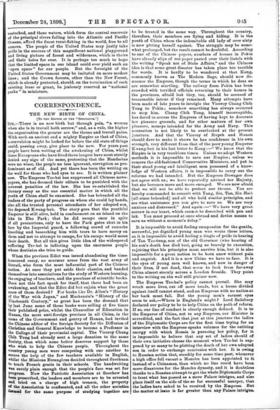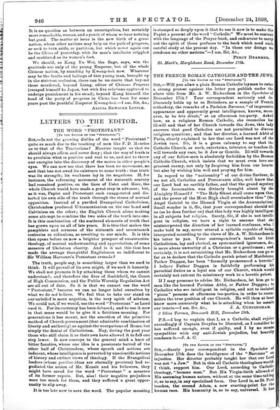CORRESPONDENCE.
THE NEW BIRTH OF CHINA.
[TO THE EDITOR 07 THE " SPECTLTOR.1
Srn,—There is no new birth but through pain, "a woman when she is in travail hath sorrow," and, as a rule, the higher the organisation the greater are the throes and travail pains. With such an ancient and a mighty Empire as that of China, a convulsion might be looked for before the old state of things could, passing away, give place to the new. For years past people have been writing of the awakening of China, whilst those E wopeans who have lived there longest have most stoutly denied any sign of the same, protesting that the Mandarins were no wiser, the people no less ignorant, corruption as pre- dominant as of old. And yet there has been the writing on the wall for those who had eyes to see. It is written plainer now. The Empress Tze-hei has suppressed all Chinese news- papers, she has doomed their editors to be punished with the severest penalties of the law. She has re-established the literary essay as the one essential matter in which all the youth of China shall be examined. She has beheaded all the leaders of the party of progress on whom she could lay hands, also all the trusted personal attendants of her adopted son, the deposed Kwang-hsii. The story goes that the youthful Emperor is still alive, held in confinement on an island on the lake in Eho Park; that he did escape once in spite of all precautions, only to have the Park gates shut in his face 'by the Imperial guard, a following crowd of eunuchs kneeling and beseeching him with tears to have mercy on them and not to attempt to escape, for his escape would mean their death. But all this gives little idea of the widespread suffering Tze-hsi is inflicting upon the enormous people whose destinies she tries to guide.
When the previous Edict was issued abandoning the time- honoured essay, no murmur arose from the vast army of literati, who form the most influential part of the Chinese nation. At once they put aside their classics, and banded themselves into associations for the study of Western learning, the engaging of teachers, and the purchase of scientific books. Does not this fact speak for itself, that there had been an awakening, and that the Edict did but enjoin what the great mass of them desired ? For books like Dr. Allen's "History of the War with Japan," and Mackenzie's "Hiotory of the Nineteenth Century," so great has been the demand that by last June some of these books were selling at five times their published price, whilst the Chancellor of Education in Hunan, the most anti-foreign province in all China, in the name of the Government and gentry of Hunan, had invited the Chinese editor of the foreign Society for the Diffusion of Christian and General Knowledge to become a Professor in the College of their provincial capital. The Viceroy Chang Chih Tang had already sent a large donation to the same Society, than which none better deserves support by those who wish to help the Chinese people. Throughout the country young men were competing with one another to secure the help of the few teachers available in English, whilst the Missions Etrangeres decided throughout Szechuan to teach French gratis in their schools. The handwriting was surely plain enough that the people's face was set for Progreso. Now the Patriotic Association at Soochow has been proscribed, the leaders and members are to be arrested and tried on a charge of high treason, the property Of the Association is confiscated, and all the other societies Conned for the same purpose of studying together are to be treated in the same way. Throughout the country, therefore, their members are flying and hiding. It is the youth of China whom the indomitable old lady of over sixty is now pitting herself against. The struggle may be some- what prolonged, but the result cannot be doubtful. According to one of the Chinese papers, numbers of houses in Pekin have already slips of red paper pasted over their lintels with the writing "Speak not of State Affairs," and the Chinese idea is that some great disaster has taken place too terrible for words. It is hardly to be wondered at that Kang, commonly known as The Modern Sage, should now de- nounce the Empress, though the terms in which he does so are somewhat startling. The railway from Pekin bas been crowded with terrified officials returning to their homes in the provinces, afraid lest they, too, should be accused of treasonable intent if they remained. Many attempts have been made of late years to inveigle the Viceroy Chang Chili Tung to Pekin ; somehow something has always occurred to stop him. Chang Chih Tung, himself incorruptible, has dared to accuse the Empress of having kept to decorate her pleasure grounds, and for other matters of her own pleasure, moneys intended for the Army and Navy. This accusation is not likely to be overlooked at the present juncture. And that the Viceroy of Hupeh and Hunan should dare to make it shows he has confidence in his own strength, very different from that of the poor young Emperor K." wang-hsil in his last letter to Kang :—" We know that the Empire is in very troublous times. Unless we adopt Western methods it is impossible to save our Empire; unleas we remove the old-fashioned Conservative Ministers, and put in their stead young and intelligent men possessed of a know- ledge of Western affairs, it is impossible to carry out the reforms we had intended. But the Empress Dowager does not agree with us; we have repeatedly advised her Majesty, but she becomes more and more enraged. We are now afraid that we will not be able to protect our throne. You are hereby commanded to consult with Yang, Sin, Tan, Sin Ilsio [all since beheaded] and all who hold similar principles, and see what assistance you can give to save us. We are very anxious and distressed." And again :—" We have very great sorrow in our heart, which cannot be described with pen and ink. You must proceed at once abroad and devise means to save us without a moment's delay."
It is impossible to avoid feeling compassion for the gentle, sorrowful, yet dignified young man who wrote these letters, as it is impossible to avoid feeling a tingle of pride in hearing of Tan Tze-tung, son of the old Governor (who hearing of his son's death has died too), going so bravely to execution, rejoicing that his principles must survive him, but it is also impossible for a great nation to be born anew without pain and anguish. And it is a new China we have to face. It is the eyes of young men well known, and now in danger of their lives, if not dead, that seem to look from far-away China almost sternly across a London fireside. They point to the writing on the wall still plainer now.
The Empress Tze-hsi's policy cannot prevail. She may wreck more lives, cat off more heads, but a house divided against itself cannot stand, and an Empress with no nation at her back must fall. But the young men's earnest eyes seem to ask,—Where is England's might? Lord Salisbury declared our policy to be to help China on the path of reform. If so, our line of conduct is clearly enough defined. It is to the Emperor of China, not to any Empress, our Minister is accredited, and the fact that just at this juncture the ladies of the Diplomatic Corps are for the first time trying for an interview with the Empress speaks volumes for the untiring energy with which Russia is pursuing her policy, for it is impossible to believe that any set of ladies should of their own initiative choose the moment when Tze-hei is sup- posed by so many to be plotting the death of her own adopted son in order to exchange courtesies with her. It is owing to Russian action that, steadily for some time past, whenever a high office fell vacant a Manchu has been appointed to it instead of a Chinaman, than which no line could have been more disastrous for the Manchu dynasty, and it is doubtless thanks to a Russian attempt to get the whole Diplomatic Corps to treat what has passed as a mere Palace intrigue, and also place itself on the side of the so far successful usurper, that the ladies have asked to be received by the Empress. But the matter at issue is far greater than any Palace intrigue. It is no question as between an unscrupulous, but certainly most remarkable, woman, and a youth of whom we hear nothing but good. The matter at issue is the new birth of a great nation, whom other nations may help on the path of progress, or seek to turn aside, or partition, but which never again can be the China of yesterday, with its men's intellects crippled and mutilated as its women's feet.
We should, as Kong Yu Wei, the Sage, says, win the gratitude not only of the young Emperor, but of the whole Chinese nation, by standing by Kwang-hsii now. Whatever may be the faults and failings of this young man, brought up in the strictest seclusion, there can be no doubt that beyond those murdered, beyond Liang, editor of Chinese Progress (escaped himself to Japan, but with five relations captured to undergo punishment in his stead), beyond Kang himself, the head of the party of progress in China has been for some years past the youthful Emperor Kwang-lisii—I am, Sir, atc.,
ALICLA. BEWICKE LITTLE.







































 Previous page
Previous page